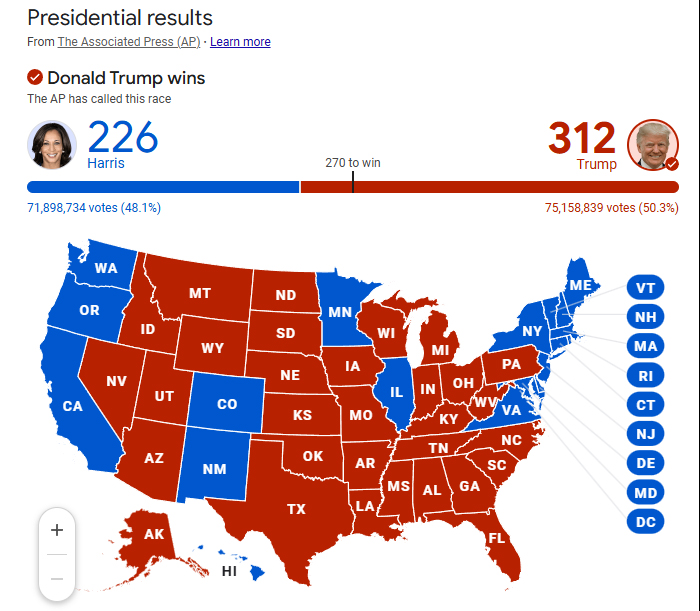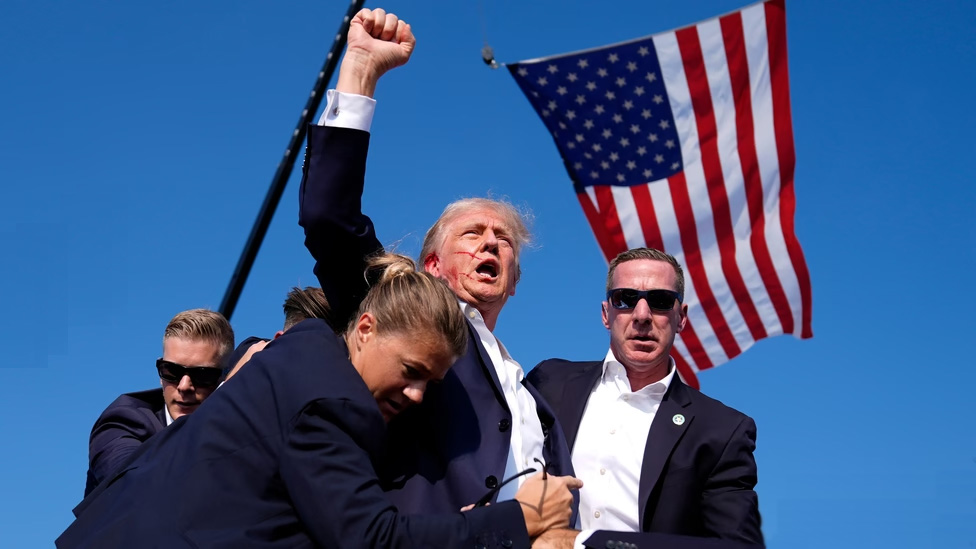The 2024 U.S. presidential election became a historic and dramatic contest, marked by the American public’s frustration over economic decline, social upheaval, and international instability. Former President Donald Trump made a triumphant return, securing over 300 electoral votes and winning key battlegrounds to retake the White House. Here are 15 reasons behind this significant political victory.
1. Proven Economic Stability
Trump’s administration was remembered for economic prosperity, low unemployment, and energy independence. Many voters believed that his policies offered more economic certainty compared to the struggles under the current administration, attracting middle-class and working families who faced inflation and job insecurity.
2. Support from New Media Influencers
High-profile figures like Joe Rogan, Dan Bongino, and independent platforms helped boost Trump’s reach. The endorsement from these influential voices countered traditional media narratives, resonating strongly with younger and more skeptical voters.
3. Endorsements from Prominent Democrats
The backing of key Democratic figures such as RFK Kennedy and Tulsi Gabbard was a turning point. Their support gave Trump legitimacy among moderates and independents, demonstrating bipartisan frustration with the current Democratic leadership.
4. Minority Community Outreach
Trump’s campaign worked diligently to connect with minority communities, emphasizing economic opportunities and critiquing Democratic policies on immigration and inflation. His “Platinum Plan” for Black and minority prosperity became a pivotal talking point.
5. Tough Stance on Immigration
The ongoing immigration crisis, with millions crossing the southern border, led to a backlash from communities affected by resource scarcity. Trump’s message of stricter border control resonated with voters who felt abandoned by lax policies that led to economic strain.
6. Defense of Free Speech
Trump’s campaign positioned him as a champion of free speech and a critic of big tech censorship. His support of Elon Musk’s ownership of Twitter (“X”) and his emphasis on preventing government overreach appealed to those wary of perceived suppression of rights.
7. Perception of Justice System Misuse
Accusations of the Biden administration targeting Republicans over misdemeanors played into Trump’s narrative of governmental overreach. This galvanized support among voters who felt the justice system was being used for political purposes.
8. Global Stability Messaging
Trump capitalized on the perception of his foreign policy prowess. His focus on achieving peace, contrasting with Democratic-led military engagements and the ongoing Russia-Ukraine war, won favor among those exhausted by conflicts.
9. Court Decisions on Election Integrity
Trump’s campaign emphasized legal victories concerning voting procedures, reinforcing his call for election transparency. Court rulings that addressed concerns over ballot handling and election deadlines helped solidify his base’s trust.
10. Promises to Working Women and Minorities
Economic appeals to women and minorities, who were disproportionately affected by inflation, formed the backbone of Trump’s pitch. His emphasis on prioritizing American workers over recent immigrants gained traction among economically distressed communities.
11. Survival of Assassination Attempts
Trump’s image as a resilient and courageous leader was bolstered by surviving multiple threats. This contributed to his narrative of being a fighter for the people, inspiring admiration and loyalty.
12. Libertarian Support
Libertarian endorsements played a critical role in swing states, adding to the momentum that brought independents and freedom-oriented voters into his coalition.
13. Dismal Performance of Current Policies
Voters were fed up with Democratic governance, associating it with failing healthcare, education, and economic policies. Issues like high emergency room visits post-Obamacare and declining public school performance gave Trump an opening to promise reforms.
14. Dissatisfaction with Progressive Agendas
Social issues, such as the participation of transgender athletes in women’s sports, alienated some traditional Democratic supporters. Trump’s stance aligned with parents and communities concerned about fairness and cultural values.
15. Ineffective Democratic Spending
Despite spending billions, Democrats failed to connect with voters or use funds effectively. Their media strategy seemed outdated compared to Trump’s mastery of new, independent media platforms.
Why Kamala Harris and Democrats Lost
Questions of Identity and Authenticity High-profile figures questioned Kamala Harris’s heritage, which impacted her credibility among Black voters. Additionally, her perceived detachment from minority concerns eroded trust within these communities.
Controversial Stances on Israel Harris’s foreign policy, especially regarding Israel, alienated Jewish voters, contributing to a significant shift of support away from the Democratic Party.
Economic Mismanagement Perception Rising inflation, high energy costs, and unsustainable debt under Biden’s administration were blamed on the Democrats, pushing frustrated voters toward Trump’s promises of economic revival.
Out-of-Touch Immigration Policy Policies perceived as exacerbating economic hardships among low-income and minority communities led to voter backlash. Harris’s approach was seen as disconnected from reality.
Association with Elitist Media Democrats’ reliance on mainstream media that many viewed as biased and elitist worked against Harris. Independent media highlighted economic struggles that mainstream outlets downplayed, fueling resentment.
Alienation of Traditional Voters Progressive stances on social issues drove away voters who felt Democrats had lost touch with everyday American concerns.
Conclusion
The 2024 election marks a dramatic shift in American politics. Trump’s campaign successfully appealed to an electorate tired of economic hardship and social upheaval, leveraging bipartisan endorsements and modern media strategies. In contrast, Harris’s campaign struggled under the weight of perceived failures, disconnects, and trust issues. As Trump promises a new era, the nation awaits to see how this political comeback shapes the future.






